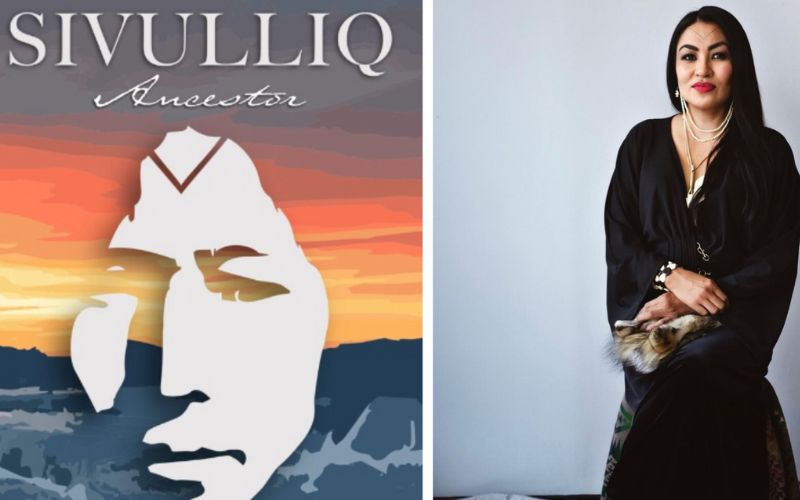
- Details
- By Kaili Berg
Iñupiaq author Lily Tuzroyluke's new book “Sivulliq: Ancestor” will be featured in the 2023 National Book Festival as part of the Great Reads from Great Places program, a list of books representing the literary heritage of each state distributed by the Library of Congress.
In “Sivulliq: Ancestor,” the story follows an Inupiaq woman on a desperate trek to rescue her daughter from the captain of a whaling ship who has kidnapped the child to take as his own. In her writing, Tuzroyluke addresses the loss Native Americans suffered from diseases, the United States not providing any form of aid, and an influx of whaling ships destroying primary food sources.
Tuzroyluke is an Iñupiaq writer from Alaska and Canada. She is a graduate student at the University of Alaska Fairbanks and previously served in Tribal government in her home Native Village of Point Hope, Alaska. She currently resides in Anchorage. Tuzroyluke spoke to Native News Online about being inspired by her elders, how her Indigenous identity informs her writing, and what she’s working on next.
This interview has been edited for clarity and brevity.
What can we expect from your book “Sivulliq Ancestor”?
The story is based in the 1890s in Arctic Alaska. It really centers around the story of a mother’s love for her children and her people. They have to take a long journey, and at the time, there was no traditional knowledge of the lands and subsistence knowledge of our ways of life.
What inspired you to write this book?
The people of Point Hope are always my inspiration. While I was living in Point Hope, I had the opportunity to listen to whaling captains and elders. That’s where it began because I knew I have always loved to write, and I was hoping to inspire Indigenous youth, other writers, and to connect with storytelling to share our perspective on the world.
Is there anything you would like readers to take away from this book?
I hope readers will gain an Indigenous perspective of the world. We have this unique way of looking at the world because of our connection to the land, ecosystems, and seasons. Hopefully, that will strike compassion and empathy with our non-Native readers at this critical time. With the climate change and extreme weather events that are happening, readers will be able to look at the Arctic and Indigenous lands in a different way.
At what point did you decide to be an author?
I really wanted to become a Tribal leader and work for a Tribal government in particular, which is what I went to school for and worked for the tribe in Point Hope. My son was then diagnosed with Autism, and as a single Autism mother, I knew there were not enough resources around to help him. We ended up moving to Anchorage, where there are no Tribal governments for me to work at. I knew I had my writing, I stayed focused and wrote every single day. I am grateful that I started writing, and I really credit my son for taking us on this path of where we are meant to be.
What other novels do you have in the works?
I am working on my next project, which will be based in British Columbia. It is a residential school story set in the 1950s. It does include child sexual violence and abuse, because those things did occur in residential schools. Many Indigenous children are the true heroes of the story.
How does your Indigenous identity inform your writing?
As a writer, my aim is to portray our unique way of looking at the world’s Indigenous people in general. The way we see land and its history is so much different than other peoples. It's important that we get the proper facts for our stories. With those proper facts, our stories can be very enlightening, inspiring, and really tels you the strength of our own people.
More Stories Like This
Watermark Art Center to Host “Minwaajimowinan — Good Stories” ExhibitionMuseums Alaska Awards More Than $200,000 to 12 Cultural Organizations Statewide
Zuni Youth Enrichment Project Takes Top Emerging Artist Apprentices to Phoenix for Artistic Exploration and Cultural Immersion
From Dishwasher to Award-Winning Chef: Laguna Pueblo's Josh Aragon Serves Up Albuquerque's Best Green Chile Stew
Rob Reiner's Final Work as Producer Appears to Address MMIP Crisis
Help us defend tribal sovereignty.
At Native News Online, our mission is rooted in telling the stories that strengthen sovereignty and uplift Indigenous voices — not just at year’s end, but every single day.
Because of your generosity last year, we were able to keep our reporters on the ground in tribal communities, at national gatherings and in the halls of Congress — covering the issues that matter most to Indian Country: sovereignty, culture, education, health and economic opportunity.
That support sustained us through a tough year in 2025. Now, as we look to the year ahead, we need your help right now to ensure warrior journalism remains strong — reporting that defends tribal sovereignty, amplifies Native truth, and holds power accountable.
 The stakes couldn't be higher. Your support keeps Native voices heard, Native stories told and Native sovereignty defended.
The stakes couldn't be higher. Your support keeps Native voices heard, Native stories told and Native sovereignty defended.
Stand with Warrior Journalism today.
Levi Rickert (Potawatomi), Editor & Publisher


